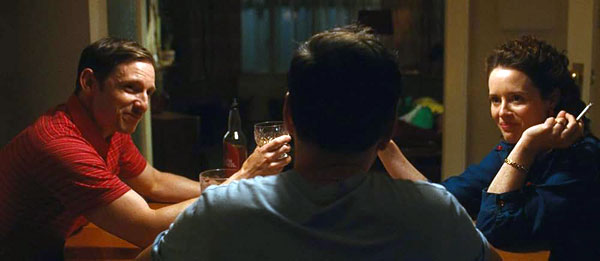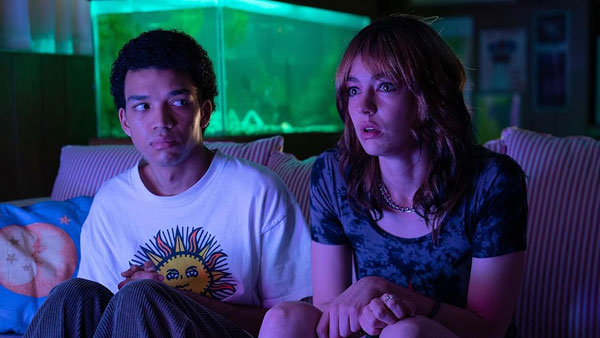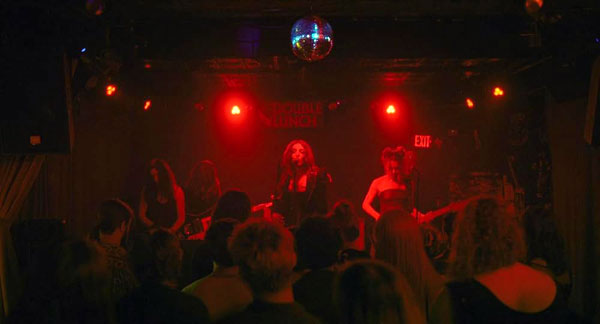|
Legal
sanctions are fewer
against LGBTQ people than
they used to be.
Societal prejudice and
incomprehension, however,
continue to make gay and
transgender life difficult
over and above the basic
problem of living in the
Universe. Two recent
films—Andrew Haigh's All of Us Strangers and Jane Schoenbrun's I
Saw the TV Glow—use
dreamlike fantasy to tell
poignant, melancholy
stories of people
consigned against their
will to be misfits.
Based on a novel by Taichi Yamada, All of Us Strangers begins
with the panorama of
London that Adam (Andrew
Scott) sees from his
high-rise window.
Adam, a screenwriter, is
almost the only tenant in
his building, and his
surroundings are
chillingly
impersonal. One
night Harry (Paul Mescal),
his only neighbor, comes
knocking with a bottle of
whiskey, half of which he
has already drunk.
Harry asks to come in,
just to talk "or whatever
you want." Adam is
tempted, but refuses.
The next day Adam travels
to the suburbs. He
wanders the pleasant
streets, stopping in front
of one house before
walking on. Ambling
through a park, he sees a
man in the distance and
follows him to a
convenience store.
The man buys some liquor,
then turns around and
faces Adam.
"Shall we go?" he asks.
"Where?" Adam asks.
"Home."
They go to the house where
Adam stopped
before. A woman comes
to the door. "Is it
him?" she asks.
It is quickly established
that the man and woman
(Jamie Bell, Claire Foy)
are Adam's parents.
It is apparent Adam has
not seen them in some
time. It is also
apparent that Adam's
parents are roughly his
age.

In his previous films Weekend, 45 Years, and Lean on Pete, Haigh established
himself as the cinema's poet of loneliness. In All of Us Strangers, he solidifies and
expands on that status. All of Us Strangers is his best film to date, and he will be
lucky to exceed it. With the aid of a brilliant cinematographer, Jamie D. Ramsay,
and a superb quartet of actors, Haigh creates a lyrical, sometimes
phantasmagorical film about a man whose circumstances have militated all his life
against human connection.
To avoid misunderstanding, I must say here that Haigh does not present
loneliness as an inevitable consequence of homosexuality. In his films, there are as
many kinds of loneliness as there are people. 45 Years is about a long-married
woman who comes to realize that her husband has never truly loved her; Lean on
Pete is about an orphaned boy whose only friend is a horse. Adam's case is just as
particular. Raised by a grandparent, without brothers or sisters, Adam never had
the chance to really know his parents, who died in a car crash shortly before his
twelfth birthday. He certainly never had a chance to know how they would have
reacted to his being gay. Through whatever process—supernatural or
imaginative—All of Us Strangers is the story of his discovering that. At one point
Adam's mother looks in his eyes and says she always heard that being gay means a
lonely life.
"If I am (lonely), it's not because of that," he says. "Not really."
She lifts an eyebrow. "Not really?"
Concurrently Adam begins a relationship with Harry, whom he encounters at the
elevator and invites up for a drink. It's been a long time since either had a love
relationship, or even sex; as Adam says, "I thought that if I fucked anybody, I'd
die." Harry's familial problems are the opposite of Adam's: his parents are still
living, he has siblings, and none of them want anything to do with him. "I've
always felt like a stranger in my own family," Harry says. "Coming out just puts a
name to the difference that's always been there."
"Things are better now—of course they are," Adam replies. "But it doesn't take
much to make you feel the way you felt."
All of Us Strangers is as quietly heartbreaking as all of Haigh's films, and with a
greater sense of tragedy, thanks to a twist at the end that I, at least, did not see
coming. The pervasive melancholy is lightened only by Frankie Goes to
Hollywood's "The Power of Love," which plays at the beginning and end of the
film. "Make love your goal," the song tells us, and that is as strong a summation of
Haigh's message as can be made.
I Saw the TV Glow is even sadder than All of Us Strangers, and even more
dreamlike—in fact, nightmarish. It depicts the power that television programs can
have over lonely kids, but it cuts far deeper than that. It is about finding your
place in a world that conspires to deny you one. The chances of your doing that,
the film tells us, are tenuous.

At the beginning, Owen (Ian Foreman) is a lonely, asthmatic twelve-year-old with
few friends, a dying mother (Danielle Deadwyler) and a dictatorial stepfather
(Fred Durst). One day at school he sees an older girl named Maddy (Brigette
Lundy-Paine) with an episode guide to The Pink Opaque, a show on the Young
Adult Network. Owen's interest is piqued. He asks her about the show, and she
eagerly tells him: The Pink Opaque is about two teenage girls, Isabel (Helena
Howard) and Tara (Lindsey Jordan), who share a psychic bond that helps them
fight supernatural villains such as Mr. Melancholy and the Ice Cream Man.
The Pink Opaque airs at 10:30, which is past Owen's strictly enforced bedtime. In
addition, Owen's stepfather Frank disapproves of the show; when Owen mentions
it one night, Frank answers, "Isn't that a show for girls?" Owen must resort to
subterfuge to sneak out to watch the show with Maddy. When subterfuge stops
working, Maddy makes VHS tapes that Owen (now played by Justice Smith) can
watch surreptitiously. Maddy's home life is even worse than Owen's; her mother
is indifferent, her stepfather abusive. At one point she confesses to Owen that she
is lesbian and asks him if he likes girls or boys.
Owen smiles shyly. "I like TV," he says.
Eventually Maddy can no longer bear life at home, and decides to run away. She
urges Owen to come with her, but Owen is too afraid. Owen graduates from
school and gets a dead-end job at the local movie theater, then another dead-end
job at a "family entertainment center," a' la Chuck E. Cheese. His stepfather dies,
and he inherits their house. He says he has a family that he loves "more than
anything," but we see no evidence of this.
Then, Maddy returns.

In discussing I Saw the TV Glow, Schoenbrun has said she based the screenplay
partly on her own absorption in such shows as Buffy the Vampire Slayer. Without
going into detail, I myself know firsthand how seductive television can be for
young people who don't fit into the real world. With the collaboration of
cinematographer Eric K. Yue, editor Sofi Marshall and production designer
Brandon Tonner-Connolly, Schoenbrun immerses us in the world of The Pink
Opaque, a world alternately alluring and terrifying, like the best fairy tales. ("The
Pink Opaque" is also the title of a 1986 compilation album by the Scottish rock
group Cocteau Twins, a group famous for its dreamlike, densely produced music.)
The final third of I Saw the TV Glow is harrowing, the performances of Smith and
Lundy-Paine reaching feverish intensity to match the hallucinatory visuals. Owen
and Maddy are on opposite paths in life, based in each case on their viewing of The Pink Opaque. Neither is happy, and some of Maddy's choices are appalling.
But Maddy at least has made choices. She will never be like Owen, whom we last
see apologizing to a roomful of people that is utterly indifferent to him.
|